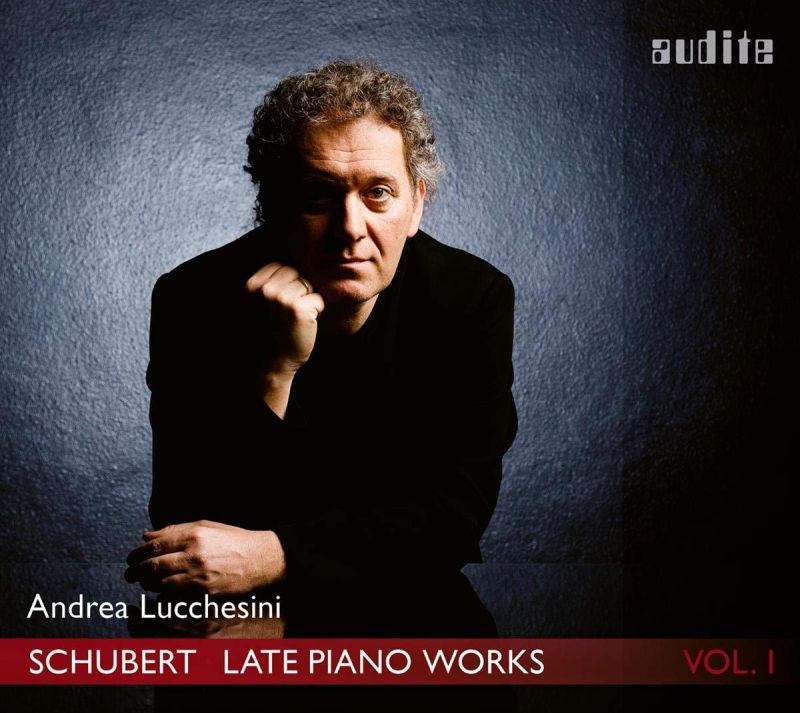SCHUBERT Late Piano Works Vol 1 (Andrea Lucchesini)
View record and artist detailsRecord and Artist Details
Composer or Director: Franz Schubert
Genre:
Instrumental
Label: Audite
Magazine Review Date: 08/2019
Media Format: CD or Download
Media Runtime: 72
Mastering:
DDD
Catalogue Number: AUDITE97 765

Tracks:
| Composition | Artist Credit |
|---|---|
| Sonata for Piano No. 20 |
Franz Schubert, Composer
Andrea Lucchesini, Piano Franz Schubert, Composer |
| Sonata for Piano No. 4 |
Franz Schubert, Composer
Franz Schubert, Composer |
| Allegretto |
Franz Schubert, Composer
Andrea Lucchesini, Piano Franz Schubert, Composer |
Author: Jed Distler
In the A minor’s opening Allegro, Lucchesini’s massive, granitic approach decidedly takes Schubert’s ma non troppo qualifier to heart. His outsize dynamics impart an austere countenance to the music that differs from the animated intimacy conveyed in Michelangeli’s 1981 DG recording. It barely hints at the aforementioned Allegretto’s controlled transparency and pinpointed voicings. For the Allegro vivace finale, Lucchesini reverts back to monumental mode, and here I prefer Eldar Nebolsin’s comparably focused yet faster, more pliable Naxos recording.
One might assume that Lucchesini’s 17-minute timing for D959’s first movement indicates a slower than usual tempo, along with his observation of the exposition repeat. But timings are deceptive. Minutes and seconds add up on account of the pianist modifying Schubert’s basic Allegro directive with frequent italicisations of phrase and emphatic caesuras and tenutos. Where others press ahead (Zimerman, Goode and Uchida, for example), Lucchesini lovingly lingers. He sustains his ruminatively unfolding Andantino with subtle ebb and flow, without quite matching the hypnotic legato and timbral allure of Imogen Cooper’s live recording. While Lucchesini carefully organises the dynamics in pursuit of maximum dramatic effect at the harrowing central climax, the latter falls short of Pollini’s unrelenting intensity and inevitability. The Scherzo’s tiny hesitations and inflections seem a tad unctuous rather than pointedly angular, as in Alfred Brendel’s valedictory live recording. As in the first movement, Lucchesini can’t help stopping to sniff at the many roadside posies spread across the finale, in contrast to Pollini’s more internalised and proportioned sense of rubato. It takes maybe five or six minutes into the movement for Lucchesini to find his emotional centre and lock into the music’s gathering momentum.
Listeners familiar with Claudio Arrau’s expansive and characterfully contrasted 1980 Philips recording of the Allegretto will find a stylistically similar yet blunter counterpart in Lucchesini’s interpretation. Fine annotations and generally good engineering that tends towards harshness at the loudest moments.
Discover the world's largest classical music catalogue with Presto Music.

Gramophone Digital Club
- Digital Edition
- Digital Archive
- Reviews Database
- Full website access
From £8.75 / month
Subscribe
Gramophone Full Club
- Print Edition
- Digital Edition
- Digital Archive
- Reviews Database
- Full website access
From £11.00 / month
Subscribe
If you are a library, university or other organisation that would be interested in an institutional subscription to Gramophone please click here for further information.




